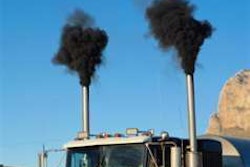Do you need a bank line of credit? Perhaps. First consider how you tend to – and how you should – deal with financial emergencies. Credit cards are the fire extinguisher of choice among owner-operators, whether it’s a brush fire or a five-alarm blaze. They’re easy to get, unless your credit stinks, but the down side is sky-high interest.
“I think the norm is people just kind of go with whatever they can get,” says owner-operator accountant Gary Aitken of Indianapolis. “They don’t realize what they’ve signed. With our customers, I say, ‘Wait a minute, you’re paying a lot of interest. Shop around.'”
Homeowners have the option of getting a home equity line. It has the advantage of tax-deductible interest payments, but the drawback of putting your home at risk. A home equity line’s interest rate will be lower than a credit card’s. It will be also beat a bank line of credit rate because, unlike the bank line, it is secured, says owner-operator accountant Kevin Rutherford of The Alliance, based in Florida.
Perry Wiseman of Truckers Accounting Service in Omaha, Neb., and Rutherford offer this advice about bank lines of credit:
DON’T WAIT. If it appears a business line of credit is right for your operation, set it up now. When an emergency hits, you don’t want to wade through weeks of red tape to get approval. Also, your loan terms will be better when your business is healthy.
KEEP IT MODEST AND PAY IT OFF. Wiseman recommends a $25,000 limit for most single-truck operators. If you use it, pay it off within a year. “If it’s $50,000 and you’re not paying it consistently, it’s a sign of trouble,” he says.
SEPARATE BUSINESS AND PERSONAL ACCOUNTS. Running your business with dedicated accounts – credit and checking – makes for clean accounting, which is better for you and the IRS. Using a bank line of credit furthers that goal and also ensures that interest payments will be deductible.
CONSIDER USING A HOME EQUITY LOAN. If you do, make sure your accountant deducts the interest as a business expense, which is worth more than an itemized personal deduction, Rutherford says.
DON’T NEGLECT A BUSINESS SAVINGS ACCOUNT. It’s the “preferred way” to deal with business emergencies, especially for leased operators with low-risk operations, Wiseman says. “Ideally you’re going to have $10,000 or $20,000 in a savings account.”
Indeed, that’s the higher road – and the one requiring a lot of discipline. But it’s always better to pay for emergencies with cash that’s been earning interest for you rather than with cash for which you’ll pay someone else interest.
EMERGENCY FUND FACTS
Even a relatively stable owner-operator business can benefit from an emergency fund to cover the unexpected – an accident, a major repair or a significant business slowdown.
Here are statistics on Overdrive readers who are single-unit operators:









